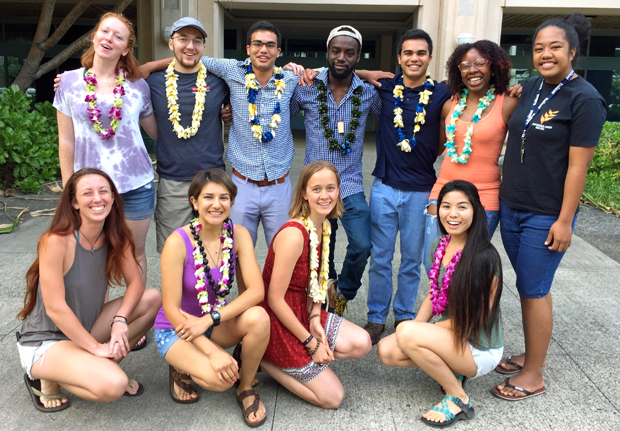
A cohort of 10 motivated undergraduate students arrived at the University of Hawaiʻi at Mānoa this week to participate in a summer research internship called Earth Science on Volcanic Islands, hosted by the UH Mānoa Department of Geology and Geophysics. The opportunity, funded for three years by the National Science Foundation’s Research Experience for Undergraduates program, seeks to increase participation in the STEM (science, technology, engineering and math) workforce by underrepresented groups.
“In practice, what this means is we find highly qualified students for whom participation in this program will have the biggest impact,” said Paul Wessel, co-director of the program and geology professor in the UH Mānoa School of Ocean and Earth Science and Technology. “We found students with great potential.”
Hands-on experiences: In the lab, in the field
Students are assigned to work with faculty throughout the geology and geophysics department for nine weeks. The internship program takes advantage of the unique tropical volcanic island and surrounding marine environments in Hawaiʻi, which are found nowhere else in the country.
Participants will conduct a wide range of original research, including studies of active and inactive Hawaiian volcanoes, environmental science in tropical watersheds and coastal environments and mapping and modeling of Earth processes. They will also participate in an expedition on the UH Mānoa research vessel Kilo Moana for three days, mapping the seafloor and collecting remotely-sensed geophysical data as well as physical samples from the seafloor and water column around the Hawaiian Islands.
A history of success
Wessel was a mentor in the late 1990s, 2000s when the UH Mānoa Department of Oceanography hosted similar NSF-funded programs. He has seen first-hand the success of these engaging programs and has high hopes for the impact the program will make this year. “Being part of a cohort going through the same thrills and challenges as a group provides strong support and is typically one of the aspects of the program that students really enjoy,” he said.
“Hands-on research internships such as this give students an authentic experience of the scientific process,” said Ken Rubin, geology and geophysics professor and department chair. “Taking classes does not always reveal that picture very clearly, but doing science under the tutelage of a mentor makes it real.”
—By Marcie Grabowski

